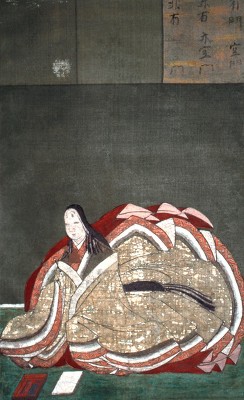Opowieść o księciu Genji (jap. Genji monogatari), rozdz. 25: Świetliki (jap. Hotaru), tłumaczenie oparte na angielskim przekładzie Arthura Waleya.
Źródło: Deborah G. Felder, 100 kobiet, które miały największy wpływ na dzieje ludzkości, Świat Książki, Warszawa 1998, ISBN 8371296665, s. 233, tłum. Maciej Świerkocki.
Dzieło
Genji monogatari
Murasaki ShikibuMurasaki Shikibu cytaty
Murasaki Shikibu: Cytaty po angielsku
“Real things in the darkness seem no realer than dreams.”
Źródło: Tale of Genji, The Tale of Genji, trans. Arthur Waley, Ch. 1: Kiritsubo
Passim. Cf. Lacrimae rerum.
Variant translations:
The pathos of things.
A sensitivity to things.
The sorrow of human existence.
Tale of Genji
Źródło: Tale of Genji, Ch. 17: Eawase (trans. Royall Tyler)
Źródło: The Tale of Genji
“Ceaseless as the interminable voices of the bell-cricket, all night till dawn my tears flow.”
Źródło: Tale of Genji, The Tale of Genji, trans. Arthur Waley, Ch. 1
source http://no-sword.jp/blog/2010/03/iced_cream.html
The Diary of Lady Murasaki
Źródło: Tale of Genji, The Tale of Genji, trans. Arthur Waley, Ch. 29: The Royal Visit
“It is in general the unexplored that attracts us.”
Źródło: Tale of Genji, The Tale of Genji, trans. Arthur Waley, Ch. 9: Aoi
“There are as many sorts of women as there are women.”
Źródło: The Tale of Genji
trans. Richard Bowring (Penguin Books, 1996)
The Diary of Lady Murasaki
trans. Richard Bowring
The Diary of Lady Murasaki
“Unforgettably horrible is the naked body. It really does not have the slightest charm.”
The Diary of Lady Murasaki
Spoken by Tō no Chūjō in Ch. 2: The Broom Tree (trans. Royall Tyler)
Tale of Genji
Źródło: Tale of Genji, The Tale of Genji, trans. Arthur Waley, Ch. 25: The Glow-Worm
Źródło: Tale of Genji, The Tale of Genji, trans. Arthur Waley, Ch. 19: A Wreath of Cloud
Źródło: Tale of Genji, The Tale of Genji, trans. Arthur Waley, Ch. 25
trans. Richard Bowring
The Diary of Lady Murasaki
Źródło: Tale of Genji, The Tale of Genji, trans. Arthur Waley, Ch. 20: Asagao
trans. Richard Bowring
The Diary of Lady Murasaki
Źródło: Tale of Genji, The Tale of Genji, trans. Arthur Waley, Ch. 36: Kashiwagi
Źródło: Tale of Genji, The Tale of Genji, trans. Arthur Waley, Ch. 41: Mirage
Źródło: Tale of Genji, The Tale of Genji, trans. Arthur Waley, Ch. 40: The Law
In Diaries of Court Ladies of Old Japan
The Diary of Lady Murasaki
